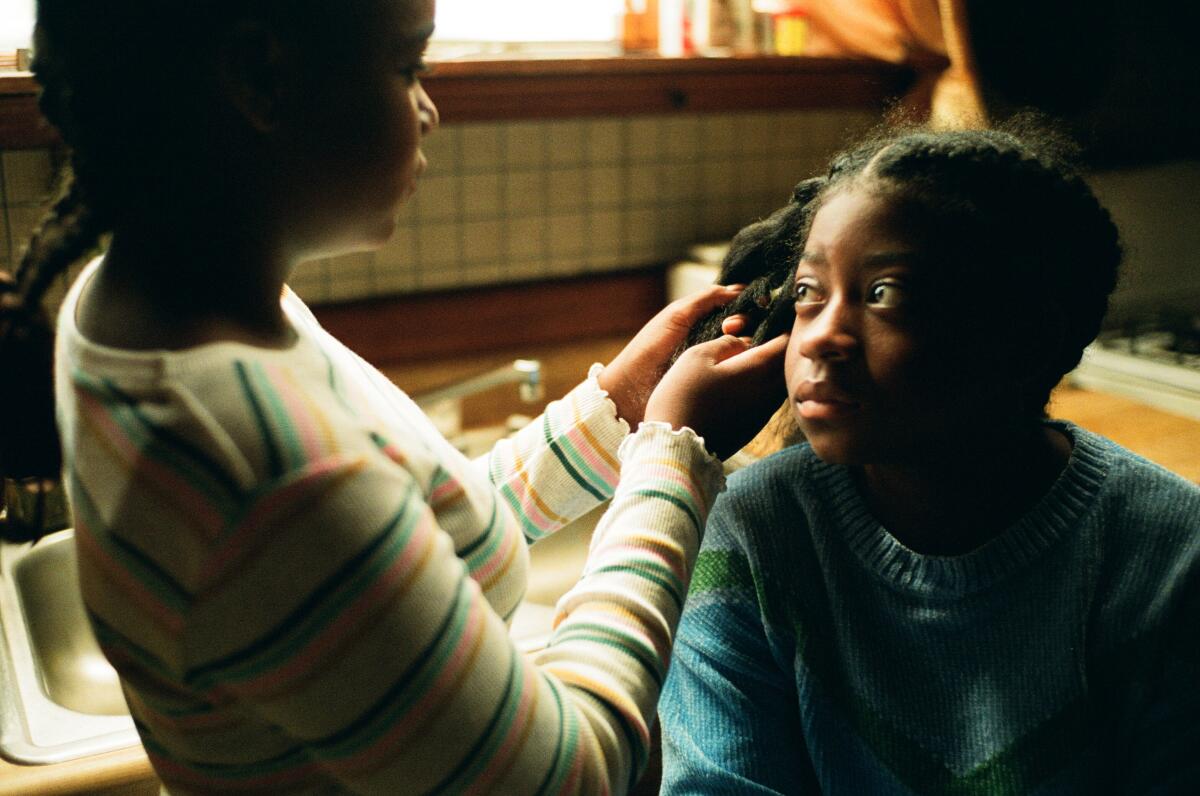‘All Dirt Roads Taste of Salt,’ one of the year’s great debuts, is a major work of art

- Share via
The two girls we see patiently digging away at a Mississippi hillside in “All Dirt Roads Taste of Salt” are taking part in an age-old tradition, one that has long been passed down by Black women in the rural South. As they shake and sift, the girls isolate choice particles of clay-enriched earth to eat, a practice that ties them to a distant African ancestral past as well as the very ground beneath their feet.
There’s wisdom in learning to embrace the delicacies of dirt: Open your eyes, your hands and your taste buds, the idea goes, and you might be surprised and even satisfied by what you find. That’s not a bad approach to some movies too, this stunningly lyrical dust-to-dust epic not least among them.
A ravishing first feature from poet and photographer Raven Jackson, “All Dirt Roads Taste of Salt” tells the story of Mack, whom we encounter as a toddler, a preadolescent, a young adult and a middle-aged woman, but not in that order. (She is played at those respective life stages by actors Mylee Shannon, Kaylee Nicole Johnson, Charleen McClure and Zainab Jah.) The story, whose earliest moments take place during the 1970s, drifts freely back and forth across years and eventually decades, never supplying obvious narrative signposts or pausing to let us get our bearings. Over time you learn to recognize Mack by the way her hair is braided, the clothes she’s wearing, the presence or absence of earrings. This is a movie that teaches you how to watch it.
That’s only fitting, since teaching is fundamental to what it’s about. It begins on the bank of a river, where young Mack (Johnson) is learning to fish from her father, Isaiah (Chris Chalk), while her older sister, Josie (played here by Jayah Henry and later by Moses Ingram), looks quietly on. “Not too quick,” Isaiah murmurs as Mack cranks the fishing rod. A similar patience suffuses this scene and others like it, none of which feel like means to an obvious dramatic end. Jackson seems to be after nothing more (or less) profound than letting us soak in the moment, and she wants us to experience its physical sensations not vicariously but viscerally: the warmth of sunlight on skin, the cool of rushing water, the rough texture of fish scales under Mack’s gently probing fingers.

In a significant sense, fingers and hands tell the story. Jackson, working with cinematographer Jomo Fray (who shot the picture on 35mm), photographs those extremities with enough grace and attention to suggest that the French master Robert Bresson might be one of her many influences. (She has cited Terrence Malick, Chloé Zhao and Carlos Reygadas, all auteurs similarly under the spell of the natural world.) Like Bresson, Jackson uses hands to remind us that our identities consist of more than faces and names, that a touch or a gesture can be equally expressive of who we are.
And so she lingers, absorbingly, over the sight of a woman pressing a newborn into her sister’s arms. Sometime later, we’ll see the siblings bathing the infant over a sink, one of them cupping handfuls of water with an almost baptismal solemnity and tenderness. Neither woman’s face is visible in either scene, an intentional omission that Jackson echoes elsewhere by shooting her characters from behind as they walk. That’s a fairly common art-film strategy that often hints at an overarching universality: These individuals represent something larger than themselves. But in the scenes of child rearing, the absence of faces expresses something more: a depth of sisterly intimacy and family solidarity that renders exposition superfluous.
Even without that exposition, “All Dirt Roads Taste of Salt” flows intuitively. Jackson has composed a sensory poem of extraordinary tactility and stealthy emotional force, but she has also constructed a story from fragments you immediately recognize and contextualize: the tragedy of losing a home, the pleasure of hearing a song in church and the consolation of resting your head in your grandmother’s lap. It’s about what happens when a young man named Wood enters the picture, first as a childhood friend of Mack’s (played by Preston McDowell) and later as her teenage sweetheart (Reginald Helms Jr.). It’s about the toughness of family bonds and the reverberant loss of Mack’s mother, Evelyn (Sheila Atim, “The Underground Railroad,” “The Woman King”), a striking presence who soon becomes an equally striking absence.

At the same time, Evelyn — so quietly alive when we see her applying lipstick before a party, or losing herself as she dances with Isaiah — never entirely vanishes. That’s partly due to the beauty of the movie’s circular, unchronological structure, which mimics the mercurial nature of memory. (The movie was edited by Lee Chatametikool, known for his dreamlike cutting for director Apichatpong Weerasethakul.) But it’s also due to a conviction that the movie holds down to its bones, namely that Mack cannot help but carry the presence of those who’ve come before her: in the words she speaks, the ablutions she dispenses, the passion she feels and, yes, the earth she touches, shapes and consumes. At the same time, Mack is very much her own being, something she drives home with a painful personal decision that is both an assertion of self and an act of love.
“All Dirt Roads Taste of Salt” had a muted reception at this year’s Sundance Film Festival, where it went mysteriously unrewarded despite being easily one of the strongest films (and one of the few actual films on film, period) in the event’s drama competition. But even storytellers of a more prosaic bent could learn something from Jackson’s gift for narrative elision and economy, her insistence on the primacy of the visual and her sparing use of music. (The strings surge gorgeously, but ever so discerningly, in Sasha Gordon and Victor Magro’s score.) There’s risk in this approach, of course: artistic risk, commercial risk, the risk of turning off audiences that react with indifference and sometimes hostility to new ways of seeing. But sometimes an audience faces a risk of its own, namely that it might overlook as powerful and uncompromised a work of American art as any to have appeared in a movie theater this year.
'All Dirt Roads Taste of Salt'
Rating: PG, for thematic content and brief sensuality
Running time: 1 hour, 37 minutes
Playing: Starts Nov. 2 at Landmark Theatres Sunset, West Hollywood
More to Read
Only good movies
Get the Indie Focus newsletter, Mark Olsen's weekly guide to the world of cinema.
You may occasionally receive promotional content from the Los Angeles Times.











